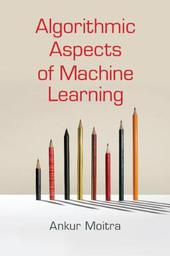
|
Algorithmic Aspects of Machine Learning
Paperback / softback
Main Details
| Title |
Algorithmic Aspects of Machine Learning
|
| Authors and Contributors |
By (author) Ankur Moitra
|
| Physical Properties |
| Format:Paperback / softback | | Pages:158 | | Dimensions(mm): Height 228,Width 152 |
|
| Category/Genre | Probability and statistics
Algorithms and data structures |
|---|
| ISBN/Barcode |
9781316636008
|
| Classifications | Dewey:006.31015181 |
|---|
| Audience | | Professional & Vocational | |
|---|
| Illustrations |
Worked examples or Exercises
|
|
Publishing Details |
| Publisher |
Cambridge University Press
|
| Imprint |
Cambridge University Press
|
| Publication Date |
27 September 2018 |
| Publication Country |
United Kingdom
|
Description
This book bridges theoretical computer science and machine learning by exploring what the two sides can teach each other. It emphasizes the need for flexible, tractable models that better capture not what makes machine learning hard, but what makes it easy. Theoretical computer scientists will be introduced to important models in machine learning and to the main questions within the field. Machine learning researchers will be introduced to cutting-edge research in an accessible format, and gain familiarity with a modern, algorithmic toolkit, including the method of moments, tensor decompositions and convex programming relaxations. The treatment beyond worst-case analysis is to build a rigorous understanding about the approaches used in practice and to facilitate the discovery of exciting, new ways to solve important long-standing problems.
Author Biography
Ankur Moitra is the Rockwell International Associate Professor of Mathematics at Massachusetts Institute of Technology. He is a principal investigator in the Computer Science and Artificial Intelligence Lab (CSAIL), a core member of the Theory of Computation Group, Machine Learning@MIT, and the Center for Statistics. The aim of his work is to bridge the gap between theoretical computer science and machine learning by developing algorithms with provable guarantees and foundations for reasoning about their behavior. He is a recipient of a Packard Fellowship, a Sloan Fellowship, an National Science Foundation (NSF) CAREER Award, an NSF Computing and Innovation Fellowship and a Hertz Fellowship.
Reviews'The unreasonable effectiveness of modern machine learning has thrown the gauntlet down to theoretical computer science. Why do heuristic algorithms so often solve problems that are intractable in the worst case? Is there predictable structure in the problem instances that arise in practice? Can we design novel algorithms that exploit such structure? This book is an introduction to the state-of-the-art at the interface of machine learning and theoretical computer science, lucidly written by a leading expert in the area.' Tim Roughgarden, Stanford University, California 'This book is a gem. It is a series of well-chosen and organized chapters, each centered on one algorithmic problem arising in machine learning applications. In each, the reader is lead through different ways of thinking about these problems, modeling them, and applying different algorithmic techniques to solving them. In this process, the reader learns new mathematical techniques from algebra, probability, geometry and analysis that underlie the algorithms and their complexity. All this material is delivered in a clear and intuitive fashion.' Avi Wigderson, Institute for Advanced Study, New Jersey 'A very readable introduction to a well-curated set of topics and algorithms. It will be an excellent resource for students and researchers interested in theoretical machine learning and applied mathematics.' Sanjeev Arora, Princeton University, New Jersey 'This text gives a clear exposition of important algorithmic problems in unsupervised machine learning including nonnegative matrix factorization, topic modeling, tensor decomposition, matrix completion, compressed sensing, and mixture model learning. It describes the challenges that these problems present, gives provable guarantees known for solving them, and explains important algorithmic techniques used. This is an invaluable resource for instructors and students, as well as all those interested in understanding and advancing research in this area.' Avrim Blum, Toyota Technical Institute at Chicago 'Moitra ... has written a high-level, fast-paced book on connections between theoretical computer science and machine learning. ... A main theme throughout the book is to go beyond worst-case analysis of algorithms. This is done in three ways: by probabilistic algorithms, by algorithms that are very efficient on simple inputs, and by notions of stability that emphasize instances of problems that have meaningful answers and thus are particularly important to solve. ... Summing Up: Highly recommended.' M. Bona, Choice '... the challenges to prove simple but unproven claims and delving deeper into the topics makes it a fascinating read ... one of the best parts of the book is the introduction to each chapter. They thoroughly motivate the topic of the chapters.' Sarvagya Upadhyay, SIGACT News
|